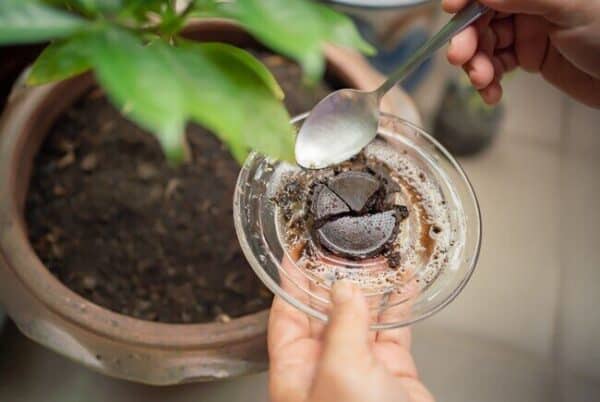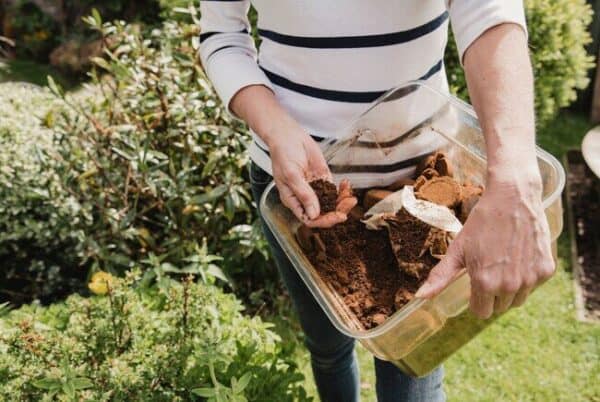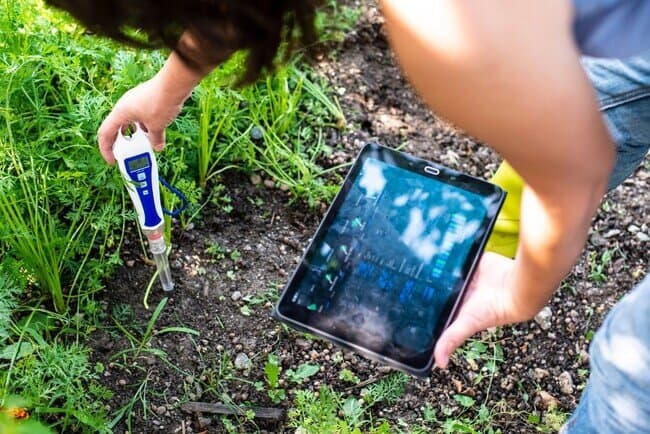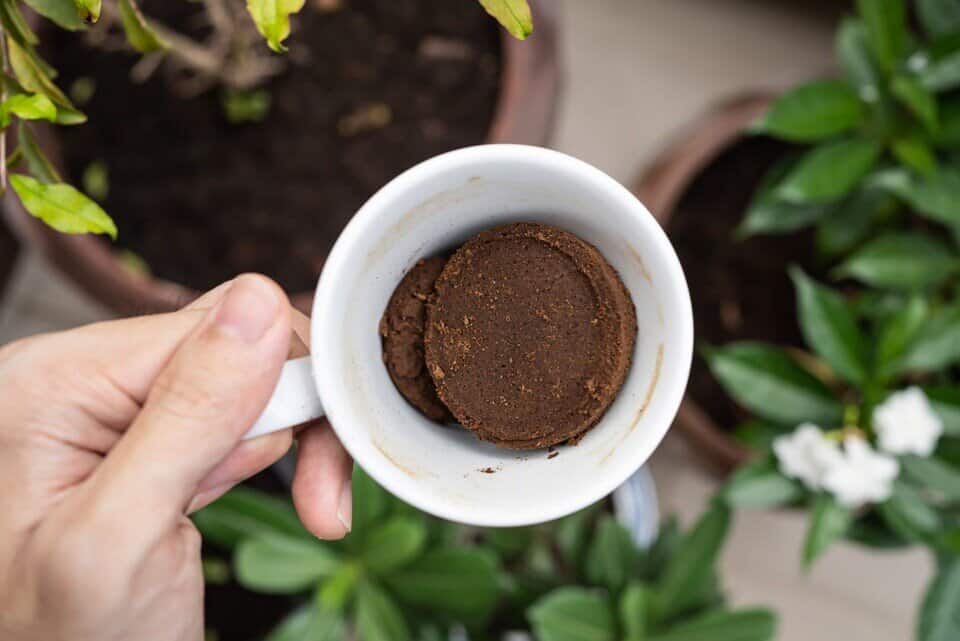Coffee is one of the most popular beverages around the world, with millions of people drinking it every day. However, what many people don’t know is that coffee grounds can be used for more than just making a delicious cup of coffee. In fact, coffee grounds can be an excellent addition to your garden.
Coffee grounds are nutrient-rich waste from brewed coffee, used as a soil amendment to improve fertility, water retention, and pest control in gardens. Suitable for various plants, but excessive use may alter soil pH. Often incorporated into compost or applied directly to soil.
When used correctly, coffee grounds can help improve soil quality, increase the nutrient content of your plants, and even repel pests. Coffee grounds are rich in nitrogen, which is an essential nutrient for plant growth. They also contain other important minerals like potassium, calcium, and magnesium, which can help improve soil pH and structure. For PH soil needs for different veggies, click this article
Using coffee grounds in your garden is an eco-friendly way to dispose of your coffee waste, and it can also save you money on fertilizers and pesticides. However, it’s important to note that coffee grounds should be used in moderation, as too much can be harmful to your plants. In this article, we’ll explore the benefits of using coffee grounds in your garden and provide tips on how to use them effectively.
Coffee Grounds 101: Unlocking the Benefits for Your Garden
Coffee grounds are a great addition to any garden. They are rich in nitrogen, phosphorus, and potassium, which are essential nutrients for plant growth. In addition, coffee grounds are a great source of organic matter, which can improve soil structure and water retention.
When adding coffee grounds to your garden, it is important to use them in moderation. Too much coffee grounds can make the soil too acidic, which can be harmful to some plants. As a general rule, coffee grounds should make up no more than 20% of the total volume of soil.
There are several ways to use coffee grounds in your garden. One way is to simply sprinkle them around the base of your plants. Another way is to mix them into your compost pile. Coffee grounds can help speed up the decomposition process and add valuable nutrients to your compost.
| Plant Type | Amount of Coffee Grounds |
| Vegetables | 1/4 inch layer around the base of the plant |
| Flowers | 1/2 inch layer around the base of the plant |
| Shrubs and Trees | 1 inch layer around the base of the plant |
It is important to note that coffee grounds should not be used as a substitute for fertilizer. While they do contain valuable nutrients, they are not a complete fertilizer and should be used in conjunction with other fertilizers.
In conclusion, coffee grounds can be a great addition to your garden when used in moderation. They provide essential nutrients and organic matter, and can help improve soil structure and water retention. By following the guidelines outlined above, you can unlock the benefits of coffee grounds for your garden.
Nutrient Boost: How Coffee Grounds Improve Soil Fertility
Coffee grounds are a great addition to any garden. They are a rich source of nitrogen, phosphorus, and potassium, all of which are essential nutrients for plant growth. When added to soil, coffee grounds can improve soil fertility and help plants grow stronger and healthier.
One of the main benefits of using coffee grounds in the garden is that they help to increase the acidity of the soil. This is particularly beneficial for plants that thrive in acidic soil, such as blueberries, tomatoes, and roses. Coffee grounds can also help to improve soil structure, making it easier for plant roots to penetrate the soil and access the nutrients they need.

When using coffee grounds in the garden, it is important to use them in moderation. Too much coffee grounds can actually have a negative effect on plant growth, as they can make the soil too acidic. A good rule of thumb is to use no more than 10-20% coffee grounds in your soil mixture.
Another way to use coffee grounds in the garden is to add them to compost. Coffee grounds are a great addition to compost, as they help to speed up the decomposition process and add valuable nutrients to the compost. When adding coffee grounds to compost, it is important to mix them in well with other compost materials to ensure that they are evenly distributed.
Coffee Grounds & Water Retention: A Perfect Match
Coffee grounds are a popular addition to gardens and can help improve soil quality in many ways. One of the most significant benefits of using coffee grounds in gardening is their ability to retain water. This can be especially helpful in areas with dry or arid climates.
When coffee grounds are added to soil, they can help improve its water-holding capacity. This means that the soil can retain more moisture, which can be beneficial for plants that require consistent watering. Additionally, coffee grounds can help prevent soil from drying out too quickly, which can be a common problem in hot, dry weather.
One of the reasons coffee grounds are so effective at retaining water is because they are high in organic matter. Organic matter can help improve soil structure and create pore space, which allows water to move more freely through the soil. This can be especially helpful in compacted soils, which can be difficult for water to penetrate.
It’s important to note that while coffee grounds can be an excellent addition to gardens, they should not be used in excess. Too much coffee can make soil too acidic, which can be harmful to some plants. It’s best to use coffee grounds in moderation and mix them well with other organic materials.
Overall, coffee grounds can be a great way to improve soil quality and help plants thrive. With their ability to retain water, they are a perfect match for gardens in dry or arid climates.
Pest Control: Utilizing Coffee Grounds as a Natural Deterrent
Coffee grounds can be used as a natural pest deterrent in the garden. The strong aroma and caffeine content of coffee can repel insects and animals that may damage plants or crops. Here are some ways to use coffee grounds for pest control:
- Slug and snail repellent: Sprinkle coffee grounds around plants that are prone to slug and snail damage. The caffeine in the coffee can kill or repel these pests.
- Ant repellent: Sprinkle coffee grounds around ant hills or areas where ants are entering the garden. The strong aroma of coffee can deter ants from entering the garden.
- Cat repellent: Cats can be deterred from entering the garden by sprinkling coffee grounds around the perimeter. The strong aroma of coffee can be unpleasant to cats.
It is important to note that coffee grounds should not be used in excess as they can change the pH level of the soil and harm plants. It is recommended to use coffee grounds sparingly and mix them into the soil or compost pile.
Coffee grounds can be a natural and effective way to deter pests in the garden. By utilizing this method, gardeners can avoid using harmful chemicals and promote a healthy and sustainable garden.
Composting with Coffee Grounds: Tips for Success
Coffee grounds are a great addition to any compost pile. They are rich in nitrogen, which is necessary for plant growth, and they also help to balance the pH level of the compost. Here are some tips for successfully composting with coffee grounds:
- Use coffee grounds in moderation. While coffee grounds are a great addition to compost, they should not make up more than 25% of the total compost volume. Too much coffee grounds can make the compost too acidic and slow down the decomposition process.
- Mix coffee grounds with other materials. To ensure that the compost is well-balanced, mix coffee grounds with other materials such as leaves, grass clippings, and kitchen scraps.
- Spread coffee grounds evenly. When adding coffee grounds to the compost pile, it is important to spread them evenly throughout the pile. This will help to prevent clumping and ensure that the coffee grounds are well-distributed.
- Compost coffee filters. Coffee filters are also compostable (not the Keurig Pods) and can be added to the compost pile along with the coffee grounds.
- Avoid adding coffee grounds to worm composting bins. While coffee grounds are great for traditional composting, they should not be added to worm composting bins. Worms do not like the acidity of coffee grounds and may avoid them.
By following these tips, gardeners can successfully compost with coffee grounds and create a nutrient-rich soil amendment for their plants.

Balancing Soil pH: The Role of Coffee Grounds
Coffee grounds can be a great addition to any garden, but it’s important to understand their impact on soil pH. Soil pH is a measure of the acidity or alkalinity of the soil, and it can have a big impact on plant growth and health. Most plants prefer a slightly acidic soil pH between 6.0 and 7.0, but some plants, such as blueberries and azaleas, prefer a more acidic soil pH.
One of the benefits of using coffee grounds in the garden is that they can help to lower soil pH. Coffee grounds are slightly acidic with a pH of around 6.2, which can be beneficial for plants that prefer a more acidic soil. However, it’s important to use coffee grounds in moderation, as too much can actually make soil too acidic and harm plants.
When using coffee grounds in the garden, it’s important to monitor soil pH regularly to ensure that it remains within the optimal range for your plants. If soil pH becomes too acidic, you can add lime to the soil to help balance it out. If soil pH becomes too alkaline, you can add sulfur to the soil to help lower it.
Having a soil PH Test Kit is a must for any kind of garden you have. There are so many to choose from and in different price ranges, it is hard to recommend which is best. Click here to see PH soil kits available.
I will say, I am a cheap skate I guess. I typically use these, they seem straight forward and won’t break the bank. See what I use here.

If you are serious about your garden, like my Sister, you can get one like she has in the picture shown I think they had a design change on the sense end? But check it out by clicking here.
Another thing to keep in mind when using coffee grounds in the garden is that they can take a while to break down and release their nutrients. This means that they are best used as a long-term soil amendment rather than a quick fix. To help speed up the breakdown process, you can mix coffee grounds with other organic matter, such as leaves or grass clippings, and add them to your compost pile.
In summary, coffee grounds can be a great addition to any garden, but it’s important to understand their impact on soil pH. They can help to lower soil pH, which can be beneficial for plants that prefer a more acidic soil, but it’s important to use them in moderation and monitor soil pH regularly to ensure that it remains within the optimal range for your plants.
Coffee Grounds in Action: Best Plants to Benefit from Them
Coffee grounds are a great addition to any garden. They are rich in nitrogen, phosphorus, and potassium, which are essential nutrients for plant growth. Here are some of the best plants that can benefit from coffee grounds:
- Tomatoes: Coffee grounds can help to increase the acidity of the soil, which is beneficial for growing tomatoes. They also contain calcium, which is important for preventing blossom end rot.
- Roses: Coffee grounds can help to increase the acidity of the soil, which is beneficial for growing roses. They also contain nitrogen, which is important for promoting healthy foliage and blooms.
- Blueberries: Coffee grounds can help to lower the pH of the soil, which is beneficial for growing blueberries. They also contain magnesium, which is important for promoting healthy growth.
- Carrots: Coffee grounds can help to improve the texture of the soil, which is beneficial for growing carrots. They also contain phosphorus, which is important for promoting healthy root growth.
When using coffee grounds in the garden, it’s important to use them in moderation. Too much coffee grounds can make the soil too acidic, which can be harmful to plants. It’s also important to mix the coffee grounds into the soil, rather than just leaving them on top, to ensure that the nutrients are distributed evenly.
Responsible Use: Avoiding Over-application of Coffee Grounds
Coffee grounds are a great addition to the garden, but it is important to use them responsibly to avoid over-application. Over-application of coffee grounds can lead to nitrogen deficiencies and pH imbalances in the soil. Here are some tips to help you use coffee grounds responsibly:
- Use coffee grounds sparingly. A little goes a long way, so only apply a thin layer of grounds around your plants.
- Mix coffee grounds with other organic matter, such as leaves or grass clippings, to help balance the nitrogen content in the soil.
- Test the pH of your soil before applying coffee grounds. If your soil is already acidic, coffee grounds can make it even more so. If your soil is alkaline, coffee grounds can help balance the pH.
- Don’t apply coffee grounds to plants that prefer neutral or alkaline soil, such as azaleas or peppers.
- Don’t apply coffee grounds to plants that are sensitive to caffeine, such as some types of ferns.
By using coffee grounds responsibly, you can enjoy the benefits of this natural fertilizer without harming your plants or the environment.
Creative Ideas: Repurposing Coffee Grounds in Garden Decor
Aside from the benefits of coffee grounds for gardening, they can also be used to add a touch of creativity to garden decor. Here are some ideas:
- Use coffee grounds as a natural dye to color fabrics or paper for garden banners or flags
- Create a coffee ground terrarium by layering coffee grounds, soil, and small plants in a clear glass container
- Mix coffee grounds with plaster or concrete to create unique stepping stones or garden sculptures
- Use coffee grounds as a natural filler for garden pillows or cushions
- Create a coffee ground bird feeder by mixing coffee grounds with peanut butter and forming into balls to hang from trees or bird feeders
These are just a few ideas to get started with repurposing coffee grounds in garden decor. With a little creativity, the possibilities are endless.

Environmental Impact: How Using Coffee Grounds Reduces Waste
Coffee grounds are a common waste product that is generated by coffee shops and households. Instead of throwing them away, coffee grounds can be used to improve soil quality and reduce waste. The following are some ways in which using coffee grounds can help reduce environmental impact:
- Coffee grounds can be used as a natural fertilizer. They contain nitrogen, phosphorus, and potassium, which are essential nutrients for plant growth. When mixed with soil, coffee grounds can help improve soil quality and promote healthy plant growth.
- Using coffee grounds as a fertilizer can reduce the need for chemical fertilizers. Chemical fertilizers can be harmful to the environment, as they can leach into waterways and cause pollution. By using coffee grounds, gardeners can reduce their reliance on chemical fertilizers and promote sustainable gardening practices.
- Coffee grounds can also be used as a natural pest repellent. They contain compounds that repel pests such as slugs, snails, and ants. By using coffee grounds in the garden, gardeners can reduce their reliance on chemical pesticides and promote natural pest control methods.
Overall, using coffee grounds in the garden can help reduce waste and promote sustainable gardening practices. By using coffee grounds as a natural fertilizer and pest repellent, gardeners can reduce their environmental impact and promote healthy soil and plant growth.


